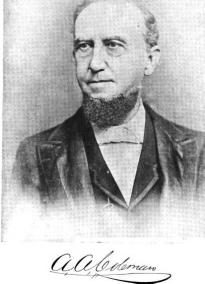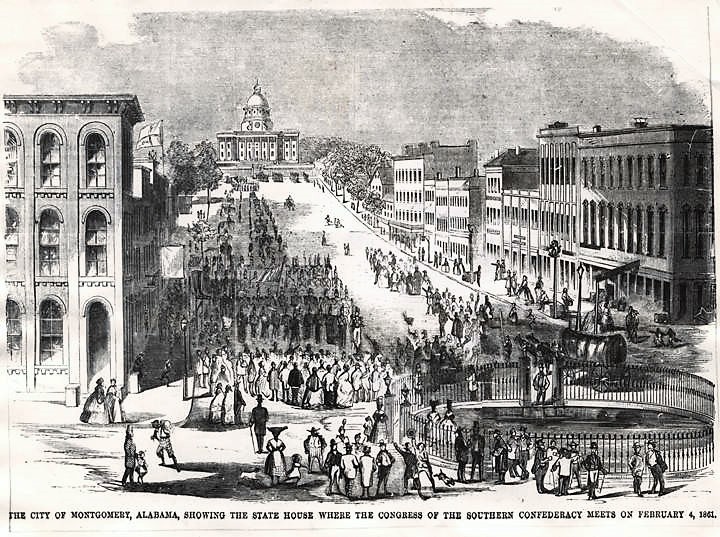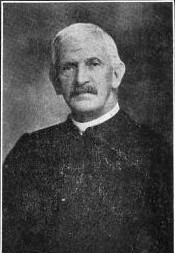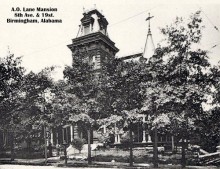Biographies of the Delegates to the Alabama Secession Convention
Part V 1
John Cochran
Barbour County
Son of a farmer in Cocke County, Tennessee, John Cochran was born in the early part of the nineteenth century. After graduating from Greenville College, where he studied law, Cochran came to Jacksonville, Alabama, in 1835 to practice. Cochran was a candidate for the legislature in 1838 but was defeated; he was elected the next year and reelected in 1840 and 1841. In 1843 he moved to Barbour County and was an unsuccessful candidate for Congress against Henry W. Hilliard in 1845; and was again unsuccessful for this office against James Abercrombie in 1851. He was elected to the legislature from Barbour County in 1853 and 1855, serving during this period as chairman of the judiciary committee.
Appointed circuit judge in 1861, Cochran was subsequently elected to the office by the people. Cochran served in the Confederate Army for a year at Pensacola, Retiring from public life
after the war, he devoted his time to the practice of his profession. His first wife was the daughter of General William Wellborn of Eufaula; the second was the daughter of Washington Toney, also of Eufaula. (Findagrave.com memorial 71125630)
John R. Coffey
Jackson County
A farmer and merchant, John R. was the son of Rice and Sallie Coffey. He was born at Wartrace, Bedford County, Tennessee, March 27, 1814, and attended the common schools of the community in which he lived and the high school at Shelbyville, Tennessee. Without a dollar in his pocket, meager schooling and no acquaintance of the county, Coffey came to Belleforte when he was fourteen years of age. Eight years later he established a mercantile business of his own at this place and operated it for ten years. Coffey was elected sheriff of Jackson County in 1840.
Enlisting in the United States Army at the outbreak of the Mexican War, Coffey organized the First Alabama Regiment at Mobile and became its colonel. At a later date, he served as lieutenant, lieutenant colonel and major general of the militia. After the Mexican War, he farmed until he went to Stevenson and opened a mercantile business. Soon after the beginning of the War Between the States he closed the store and returned to his four thousand acre farm on the banks of the Tennessee River. Coffey was a Mason and Methodist.
On January 21, 1849, he was married to Mary Ann Cross of Jackson County, Alabama. The children of this union were Eliza, Sallie, John and Clark Maclin. There is no reference found to the date of Coffey’s death.
ADDITIONAL NOTES: From Northern Alabama: Historical and Biographical, Birmingham, Ala., Smith and De Land 1888 –
JOHN REID COFFEY, of Fackler, Jackson County, son of Rice and Sallie (Bradford) Coffey, was born at Wartrace, Bedford County, Tenn., March 27, 1814.
Rice Coffey was born in Pennsylvania in 1766. When a young man he removed to North Carolina and became a gunsmith. He married and again removed to Tennessee about 1801, and settled on a farm of a thousand acres of land which he bought of General Jackson, and on which his son, John R. Coffey, was born. He died in 1853, and his wife in 1840. He was a son of James Coffey, of early times, who raised a large family, all of the older sons of whom served as soldiers in the Revolutionary War. The Coffey family are Baptists.
John R. Coffey spent his early days on a farm attending the common old-field schools. When he was thirteen years of age he went to a high school at Shelbyville, Tenn., and remained there twelve months. After this, he came to Bellefonte, without an acquaintance in the county or a dollar in his pocket, and became a clerk in a store. At the age of twenty-two, he established a mercantile business of his own in that village and continued it until 1846. In 1840, he was elected Sheriff of Jackson County. At the breaking out of the Mexican War, he enlisted in the army in a company commanded by Capt. Richard W. Jones. He afterwards acted as lieutenant, lieutenant-colonel, and major-general in the militia; went to Mobile and organized the First Alabama Regiment and was elected its colonel, and as such, participated in the siege of Vera Cruz. After the war with Mexico, he became a general of the militia. He had now returned to his farm and devoted his attention to its cultivation until 1853, when he moved to Stevenson and engaged in the mercantile business, which he prosecuted with considerable success until the beginning of the late war, when he again closed his store and returned to his farm of 4,000 acres, on the banks of the Tennessee River.
In 1861 he was elected a delegate to the convention which passed the ordinance of secession. He was bitterly opposed to that ordinance, but, being overpowered, he submitted with the best possible grace, and thereafter gave moral and substantial support to the Confederacy.
General Coffey’s grandmother was a sister to Col. Ben. Cleveland, who commanded a regiment at the battle of King’s Mountain.
General Coffey was married January 21, 1849, to Miss Mary Ann Cross, daughter of Col. Chas. and Eliza (Clark) Cross, of Jackson County. They were natives of North Carolina and came to Alabama about 1826. He was a soldier in the Indian wars, and was drowned in the Tennessee River about 1848.
His wife’s great-grandfather, Col. Wm. Maclin, and her grandfather, Robert Clark, were in the Revolutionary War; the latter was wounded in battle at Eutaw Springs, from which he died. Her grandfather, Maclin Cross, was in the battle at Nick-a-Jack, Indian Nation.
General Coffey is the father of six children, of whom four grew to maturity, namely: Eliza, wife of Wm. J. Tally; Sallie B., wife of C. W. Brown, chief clerk in the office of the State Superintendent of Education; John 15. and Clark Maclin. General Coffey’s wife died September 6, 1887. He is a member of the Methodist Episcopal Church and the Masonic order. General Coffey is a man of commanding presence, being over six feet in height and having apparently the vim and energy of a youth. He is one of the best-known men of the State and one of the most influential men in Northeastern Alabama.
Augustus Aurelius Coleman
Sumter County

Born May 21, 1825, at Camden, Kershaw District, South Carolina, Augustus Aurelius was the son of Dr. James Brown and Louise Coleman. Educated in-the common schools at Camden, South Carolina, and Marion Junction, Alabama, Coleman entered Yale in 1840 and was graduated with an A.B. degree in 1844. He then went to Cahaba, Dallas County, Alabama and read law in the office of Charles G. Edwards and William Hunter. After being licensed to practice in 1846, he was justice of the peace at Cahaba in 1847-48. In 1848 he went to Livingston, Alabama, and formed a law partnership with B. W, Huntington. Ten years later he was appointed to the judgeship of the seventh judicial court by Governor A. B. Moore and was elected to this position a few months later and reelected in 1864. On May 16, 1862 he was elected colonel of the Fortieth Alabama Infantry Regiment, which he . commanded in part of the Vicksburg Campaign. Resigning his command in 1863, Judge Coleman returned to the bench and served in that capacity until after the war. Moving to Greensboro in 1866, he represented Hale County in the state legislature in 1884-85, and was one of the founders of Southern University at Greensboro. Some eight years after he removed to Birmingham in 1888 Coleman was elected judge of the tenth-judicial circuit and was reelected to this office in 1904. Interested in religious and fraternal affairs, he was a Methodist, Mason and Odd Fellow. He was first married to Amanda Malvina Phares of North Carolina on October 5, 1848. His second wife was Mary Stewart of Virginia whom he married on April 28, 1892. The children by his first wife were James, Frank, Reavis, Preston, Wesley, Augustus Aurelius and Phares; the only child borne by his second wife was Stuart. Coleman died at Birmingham on June 5, 1910. (Findagrave.com memorial 110930768)
ADDITIONAL NOTES: See more biographical information at: https://www.alabamapioneers.com/biography-judge-augustus-aurelius-coleman-born-1826/
Joshua Prout Coman
Limestone County
Joshua Prout Coman was born April 4, 1812, at Wadesboro, North Carolina, and died at Athens, Alabama, on December 2, 1885. He was the son of Robert and Jane Wade Prout Coman. The Prouts and Comans in 1814 moved to Huntsville, then in the Mississippi Territory, and engaged in the real estate business. Coman’s mother died when he was only four years of age; his father when he was seven. After the death of their parents, Coman’s brothers and sisters were sent to a paternal uncle in North Carolina, but he lived with his two maternal aunts. He attended the “Sixteenth Section School” and graduated in medicine from Transylvania University. In 1829 he began to practice his profession at Athens. Coman represented Limestone County in the legislature in 1835; was a delegate to Constitutional Conventions of 1865; a state senator for four years; and probate judge during the last years of his life. On August 26; 1835 he was married to Jane Heland Lindley of Limestone County. Their children were James Lindley, Broussais, Louise Emmet, Frances Fawn and Robert Brickell.
James Wilson Crawford
Bibb County
Coming- from a pioneer family of Bibb County, James Wilson Crawford was born at Centerville, Alabama, February 15, 1822. He was the son of Captain Thomas Crawford, who first came to what is now Alabama in a company of North Carolina soldiers but later surveyed and laid out Centerville. Graduating in medicine from the University of Louisiana in 1849, Crawford returned to the place of his birth and practiced for almost forty years. In addition to attending the Secession Convention, he represented Bibb County in the legislature in 1855-56. Although he was ready to join the ranks of his fellow men when war began, he remained at home at the urgent request of the people of Bibb County. A leader in religious and fraternal affairs of the county, he was a Mason and Presbyterian. Dr. Crawford was married to Sallie Huey of Smithland, Kentucky. There were children but their names are not available. He was buried in the cemetery at Centerville. (billiongraves.com – James-W-Crawford/13436809)
David Bryant Creech
Dale County
A son of Joshua and Mary Creech, David Bryant was born July 2, 1811, in Montgomery County, Georgia, and died at Sylvan Grove, Dale County, Alabama, on June 4, 1863. Creech moved from Telfair County, Georgia, to Alabama in 1854, but it is not known when he went to the former. He represented Dale County in the legislature of 1860-61. Before coming to Alabama, Creech served as an officer during the Indian War of 1836; ill health prevented him from seeing active duty in the Confederate Army, but he was a mustering officer. His wife was Judith Douglas McClennan of Lumber City, Georgia.
1 Transcribed from The Alabama Historical Quarterly, Vol. 03, Nos. 03 & 04, Fall and Winter Issue 1941






i have been a Patreon supporter and i cannot see the article.
Hi Clay,
You joined as a $1 supporter which is the ‘No Reward, I just want to support Alabama Pioneers’ level. Unlocking the stories starts at the $2 level and additional rewards continue from there. Since there may have been some confusion when you signed up, we will email a copy of this story to you separately. Thank you for your support! Donna